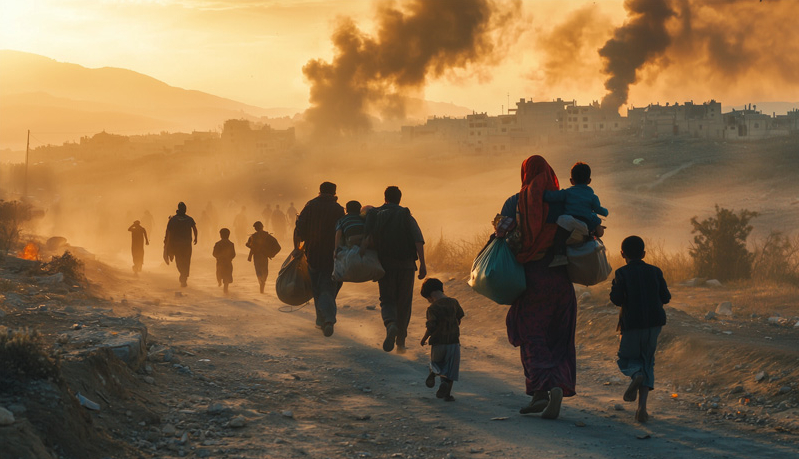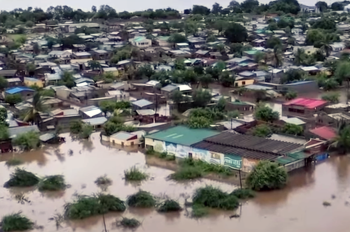
This year marks 35 years since one of the worst forced internal displacements in Sri Lanka. In 1990, hundreds of thousands of people were forced to flee their homes. Many died along the way due to bombings and shelling. My family and I were among those who had to escape.
As we remember those who are still displaced on World Refugee Day, I invite you to take a few minutes to read my story—how, during one of the most challenging times in my life, Seven Churches stepped in to help my family and me. Their care left a lasting impression on me and shaped my decision to serve among displaced people.
The importance of the Church in caring for displaced people.
Although I may not fully agree with the doctrines of these churches, their response to our journey, both good and bad, has taught me the importance of the Church in caring for displaced people. Their actions are part of the reason I now work with others who have been forced to flee their homes.
The journey begins
On June 13, 1990, a ceasefire between the Sri Lankan government and the Tamil Tigers (who controlled parts of the North and East) collapsed. At the time, I was in Colombo with my father, who was on a business trip. Our home was in Trincomalee, a small town on the Eastern coast known for its natural harbor, beaches, and its mix of ethnic and religious communities. Tensions were high in the area.
We soon learned that the entire city had fled.
On the morning of June 14, 1990, we boarded a bus to return home. But when we reached the district border, the military stopped us and said we couldn’t continue. Like many others, my father and I began walking towards our town, worried about our family. We soon learned that the entire city had fled. We had no idea where our loved ones were.
1. Divine Love Church, Nilaveli — an open home
We eventually found our family at Divine Love Church, a small Pentecostal church near the coast of Nilaveli, about 15 km (9.32 miles) from our house. The pastor and his family opened their home and church to us. They gave us food, shelter, and comfort during those dark days.
When you walk through the fire, you will not be burned.
As fear and confusion spread, people gathered at the church for prayer and Bible study. I clearly remember one devotional reading: Isaiah 43:2 “When you pass through the waters, I will be with you; and when you pass through the rivers, they will not sweep over you. When you walk through the fire, you will not be burned; the flames will not set you ablaze.”
These words gave me strength, even after we heard that our house and all our belongings had been destroyed by fire. My father lost everything—his business, our home; but our faith kept us going.
2. My local church pastor from Trincomalee – escape funding
As the military advanced, we had to move again. We reached a place called Pudavakattu. The only way forward was to take a boat by night. It wasn’t just my immediate family—we were part of a larger group, including friends and relatives.
On the night of June 25, 1990, Pastor John and his wife gave my father their wedding rings to pay the boatmen. It was their first wedding anniversary. They didn’t want anyone to be left behind just because of money.
We crossed the sea in a small fiberglass boat.
We crossed the sea in a small fiberglass boat packed with over 30 people, scared that the navy might stop us. But by God’s grace, we reached the shore safely the next morning at a place called Alampil.
3. St. Anthony’s Church, Alampil – an unforgettable meal
We were exhausted and hungry. We weren’t the only ones—hundreds had arrived on boats. The Catholic parish of St. Anthony’s Church in Alampil welcomed everyone. They served cooked rice and curry on teak leaves because they had no plates for hundreds of people.
The volunteers were all local fishermen and their families. There was no help from any agency—only the church and its people. That simple meal meant so much to us on that day.
4. Apostolic Church, Puthukudiruppu – a New Testament gift
We continued on to Puthukudiruppu, about 30 km from Alampil. On a Saturday morning, I saw a small church and walked in. The pastor, David, and his wife lived there. By this time, I was very confused and even began to justify the armed struggle in my mind.
It was common for children as young as 12 to be recruited as child soldiers.
It was common for children as young as 12 to be recruited as child soldiers. As the war intensified, more and more children were drawn into the conflict. Pastor David gave me a New Testament and prayed with me. We had fled with nothing, so that New Testament became my only devotional book during the months that followed.
5. House of Prayer – caring strangers
One day, a family we didn’t know invited us for a meal. They were connected to a local church called House of Prayer. Later, my father told me they also gave him some money to help with our next journey. They were total strangers, but their kindness helped us continue.
6. Catholic School/Church in Vavuniya – the risk of shelter
By early August, we reached Vavuniya, a town under government control. It was a dangerous time—young people were being arrested or disappeared without reason. Military rules were strict, and anyone helping strangers risked their lives. However, a local Catholic parish priest allowed us to sleep in a school hall and arranged for locals to bring us food. That risky act of bravery gave us safety at a critical time.
7. A Mega Church in Colombo – a lesson to learn
We reached Colombo. We hoped extended family or friends would help us recover. One evening, I attended a church service called “Miracle Night. I clearly remember the date as August 9th, 1990.
This church seemed to celebrate the very forces that caused so much pain.
During the service, a military commander was invited on stage and praised for his role in the war. People prayed that he would lead the country to victory. I was deeply confused. For months, I had seen people suffer, and now this church seemed to celebrate the very forces that caused so much pain.
Even so, some leaders in that same church helped me in the months that followed, during a time of heavy military presence.
Final thoughts
Even after 35 years, I still believe that Jesus' Church is one of the best institutions that can honestly care for strangers and offer hope to the displaced. Sometimes, churches don’t realize how much impact they have, even on just one person, whether a child or an adult.
These seven churches became part of my life story. I didn’t get to thank all of them, but they played a role in shaping who I am today. Their love, courage, and care taught me why the Church must always be ready to stand with those who are displaced. I hope this encourages you to do likewise if the time comes.
Jude Simion is CEO of Philoi Global and serves on the Core Leadership Team of Refugee Highway Partnership. Philoi Global responds to the humanitarian gaps of persecuted minorities through relief, relocation, and resettlement; cultivating compassion, unity, and support for the displaced.






